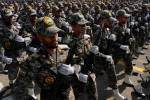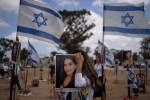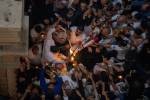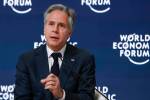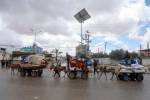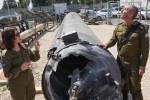Trump launches debut international trip with stop in Saudi Arabia
RIYADH, Saudi Arabia — Air Force One departed Friday for Saudi Arabia, the first stop of President Donald Trump’s eight-day debut foreign trip.
Trump is scheduled to meet with Saudi King Salman and members of the royal family on Saturday. On Sunday, he is expected to meet with leaders from the Gulf Cooperation Council and lunch with more than 50 Arab and Islamic leaders.
During a speech to Coast Guard cadets this week, Trump said that in his meeting with Muslim leaders he would “challenge them to fight hatred and extremism, and embrace a peaceful future for their faith.”
Trump will call for unity in the fight against radicalism in the Islamic world and avoid the tough anti-Muslim language from his presidential campaign, the Associated Press reported on Friday, citing a draft of his Sunday speech.
“We are not here to lecture — to tell other peoples how to live, what to do or who to be. We are here instead to offer partnership in building a better future for us all,” the draft address reads.
In addition to Saudi Arabia, the Trump delegation also will visit Jerusalem, the Vatican, Brussels and Sicily before heading back to Washington.
“The trip has three core purposes,” National Security Adviser H.R. McMaster has explained. “First, to reaffirm America’s global leadership. Second, to continue building key relationships with world leaders. And, third, to broadcast a message of unity to America’s friends and to the faithful of three of the world’s greatest religions.”
Noting that Trump “campaigned on national security and getting rid of ISIS,” Zudhi Jasser, founder and president of the American Islamic Forum for Democracy, said “it makes sense” for him start in Saudi Arabia. Still, Jasser is worried that the Trump Team has been talking up an “Arab NATO,” because unlike many Middle Eastern nations, NATO member nations are democracies.
The Saudis have reason to see Trump as potentially a formidable ally. For one thing, Trump was highly vocal in his opposition to President Barack Obama’s nuclear deal with Iran; the Saudis strongly opposed that deal. Also, they “thought that Obama was too disengaged” in the region, according to Simon Henderson of the Washington Institute for Near East Policy.
When Obama visited Riyadh in 2016, King Salman snubbed him by sending a prince to greet the U.S. president at the airport, while the King greeted other world leaders personally.
McMaster said Trump will use this visit to show that “America First does not mean America alone. To the contrary, prioritizing American interests means strengthening alliances and partnerships that extend our influence and improve the security of the American people.”
Controversy in Israel
Controversy likely will greet Trump when he lands in Tel Aviv on Monday. In Israel, Trump has telegraphed, “I’ll reaffirm our unbreakable alliance with the Jewish state.”
As a candidate, Trump promised to move the U.S. Embassy from Tel Aviv to Jerusalem – a city that Israelis and Palestinians both see as their capital. Under the Jerusalem Embassy Act of 1995, Trump has until June to decide whether to sign a waiver to keep the embassy where it is.
Past presidents Bill Clinton and George W. Bush made the same pledge, then failed to do so after winning election. The administration has sent conflicting signals as to whether Trump will stick to his pledge.
Earlier this month, Palestinian leader Mahmoud Abbas met with Trump at the White House for their first encounter and a chance to discuss the Palestinian-Israeli peace deal the president dreams of negotiating. Secretary of State Rex Tillerson told Sunday’s “Meet the Press” he fears an embassy move would hurt negotiations.
Israeli Prime Minister Benjamin Netanyahu responded, “Moving the U.S. embassy to Jerusalem will not only not harm the peace process, it will advance it by correcting a historical wrong and by shattering the Palestinian fantasy that Jerusalem is not the capital of Israel.”
Netanyahu’s February visit to the White House included a press conference at which both he and Trump demonstrated a strong personal bond and lavished praise on each other. With his eye on a big peace deal, however, Trump told Netanyahu, “I’d like to see you hold back on settlements for a little bit.”
Trump was less direct when Abbas visited the White House. “There cannot be lasting peace,” he said, “unless the Palestinian leaders speak in a unified voice against incitement to violence and hate.”
Trump will meet with both Netanyahu and Abbas in Israel. Trump and the first lady will dine with the Netanyahus Monday night. On Tuesday, Trump is expected to meet with Abbas in Bethlehem.
Audience with the Pope
On Wednesday, Trump heads to the Vatican where he will have an audience with Pope Francis during which Trump plans to discuss “the contributions of Christian teachings to the world.”
During the 2016 campaign, Trump and the Pope publicly sparred on immigration and climate change.
“It makes me very nervous,” said Austin Ruse, Catholic author and president of C-Fam, a family research institute, as well as a member of Trump’s Council of Catholic Advisers, “because these two are very different people with very different priorities.”
After the religious capitals, Trump turns to international negotiations. On Thursday, it will be Belgium and a NATO summit at which Trump will meet new French President Emmanuel Macron. The Trump administration has threatened to pull out of NATO if member nations do not pay their pledged share of NATO’s defense.
According to Heritage Foundation senior fellow James Carafano, who was on the Trump transition team, the NATO meeting also could give the administration the opportunity to roll out an Afghan war strategy. “The NATO allies would kind of like to know.”
Trump’s first international tour ends in Sicily with the Group of Seven economic powers. There leaders from Germany, France, Britain, Italy, Japan and Canada will push Trump to walk away from his campaign pledge to “cancel” U.S. participation in the 2015 Paris climate change accord. Press Secretary Sean Spicer announced earlier this month that Trump will not decide whether to stay in the Paris agreement until after G7.
Contact Debra J. Saunders at dsaunders@reviewjournal.com or at 202-662-7391. Follow @DebraJSaunders on Twitter.






















